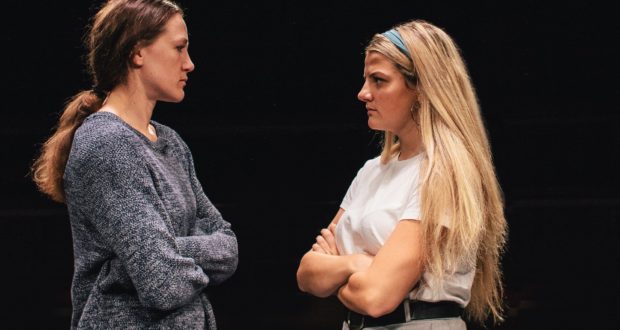Reunited in the house where their terminally ill father is slowly slipping away, two sisters can't stop bickering in a realistic but exhausting portrayal of family life. Summary
Rating
Good
Sisters Pauline (Charlotte Bate) and Rachel (Charlotte O’Leary) have a nine-year gap between them and very different roles within the family. Looking after her sibling from a young age, Pauline has learned to shelter Rachel from family dramas. When their mother walked out on them, she took charge of the house. When their father falls ill, she takes his care upon herself. Meanwhile, relieved from such obligations, Rachael has the chance to progress with her studies, becoming independent and with good career prospects.
With their father’s deteriorating health, though, Rachael decides to return home to offer some respite to her older sister. Inevitably this brings along changes to the daily running of the household, causing the two women to collide. Pauline is repressed, resentful, unwilling to accept her sister’s help, whilst Rachel is extrovert, self-assured and eager to take on more responsibilities.
Through a series of flashbacks – in which Toyin Omari-Kinch plays a plethora of male roles – we get to better understand the development of the two characters, despite this being clogged with too many squabbles. As pessimism clashes with the idealism, we witness a constant reproaching of one another, which eventually becomes tiresome.
Author Charley Miles steers clear from taking sides, leaving the audience free to decide which of the two sisters may be in the right. Valid arguments are presented for both, but a lack of opinions makes this play feel aseptic. Nevertheless, she deserves credit for such a vivid portrayal of sisterly bickering.
The occasional twists in the plot – like Rachael’s contacting her mother or her fleeting political activism – are inconsequential. Why their mother left them, what disease is affecting their father or Rachel’s imminent career choices are all questions whose answers lay under the surface.
Ultimately, I didn’t enjoy watching Daughterhood because it reminded me too much of a painful relationship with my older sister. After 70 minutes of petty arguments, yelling and reciprocal accusations, I left the Roundabout completely exhausted, still unsure whether the two women would ever find a middle ground.
Author: Charley Miles
Director: Stef O’Driscoll
Producer: Paines Plough and Theatr Clwyd
Box Office: +44 (0)131 226 0000
Booking Link: https://tickets.edfringe.com/whats-on/daughterhood
Booking Until: 25 August 2019
 Everything Theatre Reviews, interviews and news for theatre lovers, London and beyond
Everything Theatre Reviews, interviews and news for theatre lovers, London and beyond



